

This is often caused by the conflict of the employer's expectations against the employee's capabilities. The stress felt by the employee is usually caused when these expectations are not met. 4 Healthy Ways to Cope with Stress. Stress has been characterized as a physiological demand placed on the body when one must adapt, cope or adjust with situations (Nevid & Rathus, 2003).
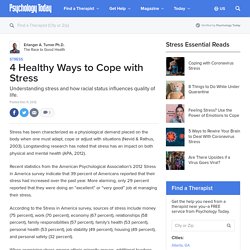
Longstanding research has noted that stress has an impact on both physical and mental health (APA, 2012). Recent statistics from the American Psychological Association’s 2012 Stress in America survey indicate that 39 percent of Americans reported that their stress had increased over the past year. More alarming, only 29 percent reported that they were doing an “excellent” or “very good” job at managing their stress. article continues after advertisement. Best and Worst Ways to Cope With Stress. Worst: Eat your feelings Like alcohol or drugs, food often becomes a crutch when coping with difficult times.

Soothing your pain with high-calorie, high-sugar, or high-fat comfort foods feels good at first, but it can quickly spiral out of control when your mind and body begin to associate negative emotions with eating. At the first sign of stress, anger, or sadness you'll instinctively reach for food rather than dealing with the feelings at hand. Overeating can cause weight gain and make you feel worse about yourself, as well as exacerbate the GI issues (bloating, reflux, constipation) that often accompany stress, says Hall. Worst: Eat your feelings Like alcohol or drugs, food often becomes a crutch when coping with difficult times.
7 Stress Management Tips. 10 Simple Ways to Cope with Stress. 16 Simple Ways to Relieve Stress and Anxiety. Stress and anxiety are common experiences for most people.
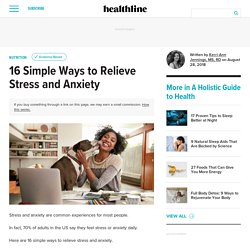
In fact, 70% of adults in the US say they feel stress or anxiety daily. Here are 16 simple ways to relieve stress and anxiety. Exercise is one of the most important things you can do to combat stress. It might seem contradictory, but putting physical stress on your body through exercise can relieve mental stress. The benefits are strongest when you exercise regularly. There are a few reasons behind this: Coping with stress: Workplace tips. Coping with stress: Workplace tips Job stress can be all-consuming — but it doesn't have to be.
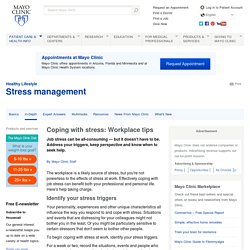
Address your triggers, keep perspective and know when to seek help. By Mayo Clinic Staff. Stress Management: 13 Ways to Prevent & Relieve Stress. Stress in the Workplace. 9 Simple Ways to Deal With Stress at Work. According to research, the percentage of Americans who are stressed at work is high, and it’s only getting higher.
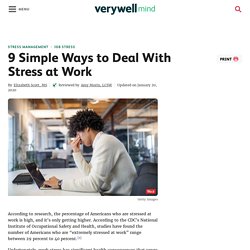
According to the CDC’s National Institute of Occupational Safety and Health, studies have found the number of Americans who are “extremely stressed at work” range between 29 percent to 40 percent.1 Unfortunately, work stress has significant health consequences that range from the relatively benign—more colds and flu—to the more serious, like heart disease and metabolic syndrome.2 But, because stress at work is so common, finding a low-stress job may be difficult or impossible for many people. A more realistic choice would be to simply adopt more effective strategies to reduce stress at work. Here are some stress management techniques to try. Start Your Day off Right Be Clear on Requirements.
Workplace Stress - The American Institute of Stress. Although the Institute is often asked to construct lists of the “most” and “least” stressful occupations, such rankings have little importance for several reasons.
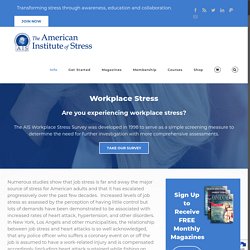
It is not the job but the person-environment fit that matters. Some individuals thrive in the time urgent pressure cooker of life in the fast lane, having to perform several duties at the same time and a list of things to do that would overwhelm most of us — provided they perceive that they are in control. They would be severely stressed by dull, dead-end assembly line work enjoyed by others who shun responsibility and simply want to perform a task that is well within their capabilities. The stresses that a policeman or high school teacher working in an inner city environment are subjected to are quite different than those experienced by their counterparts in rural Iowa. Stress is a highly personalized phenomenon and can vary widely even in identical situations for different reasons. Work stress precipitates depression and anxiety in young, working women and men. The biggest cause of stress in America today. Money continues to be the leading cause of stress for Americans, a new survey finds.
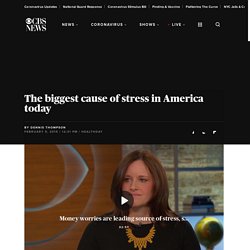
Overall, stress in the United States is at a seven-year low, and average stress levels are declining, the American Psychological Association poll found. But money worries continue to nag at the American psyche, despite the ongoing economic recovery, the association says in its report released Feb. 4, titled Stress in America: Paying With Our Health. Financial worries served as a significant source of stress for 64 percent of adults in 2014, ranking higher than three other major sources of stress: work (60 percent), family responsibilities (47 percent), and health concerns (46 percent). Nearly three out of four adults reported feeling stressed about money at least some of the time, and about one in four adults said they experienced extreme stress over money during the past month, according to the report.
42 Worrying Workplace Stress Statistics - The American Institute of Stress. Effects of Stress in the Workplace statistics 20.
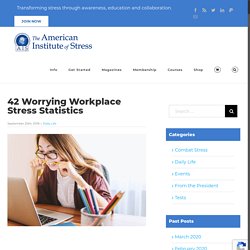
During 2018, 76% of US workers said that workplace stress affected their personal relationships. (Korn Ferry) This is another statistic that demonstrates just how much workplace stress affects other areas of our life. According to research by Korn Ferry, the majority of stressed employees reported that workplace stress has impacted upon their personal relationships in a negative manner. 21. It goes without saying that stress impacts health. The Relationship Between Job Stress and Quality of Life Among Working Adults. Young adults spend more than six hours per day feeling ‘stressed out’, finds Mental Health study. Young adults spend more than six hours a day "stressed out", a study has found.
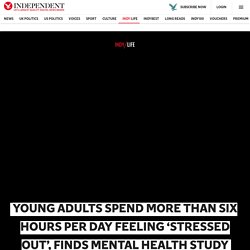
A poll of 1,000 18-25-year-olds found money, appearance and career worries as well as fears about the future mean a large chunk of their time is spent feeling anxious or under pressure. But one in 10 feel they have no-one to turn to discuss their concerns, leaving them to face their fears alone. Download the new Independent Premium app Sharing the full story, not just the headlines A further 67 per cent admitted they had come across problems in their life where they felt they had nobody to lean on for help. As a result, 56 per cent have ended up in more trouble after keeping a problem to themselves rather than confiding in someone else.
The statistics emerged in a study by charity, UK Youth, to launch its #KeepMeSafe campaign, which calls on all organisations working with young people to "look" at their safeguarding policies, "listen" to young people and take action during National Safeguarding Month. 1. 2. 3. 4. Understanding Stress and How It Affects the Workplace. Workplace Stress and Your Health. 11 Signs and Symptoms of Too Much Stress. Stress is defined as a state of mental or emotional strain caused by adverse circumstances.
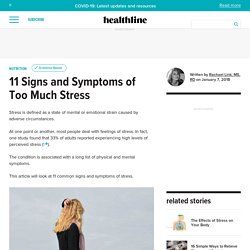
At one point or another, most people deal with feelings of stress. Phwa survey summary. Stress: Symptoms, Causes, and Stress Management. Conclusions about the effects of stress Uncontrollable, unpredictable, and constant stress has far-reaching consequences on our physical and mental health. Stress can begin in the womb and recur throughout life. One of the potential pathological (abnormal) consequences of stress is a learned helplessness that leads to the hopelessness and helplessness of clinical depression, but in addition, many illnesses, such as chronic anxiety states, high blood pressure, heart disease, and addictive disorders, to name a few, also seem to be influenced by chronic or overwhelming stress. Nature, however, has provided us with efficient processes (mechanisms) to cope with stressors through the HPA axis and the locus coeruleus/sympathetic nervous system.
Good Stress Vs. Bad Stress. What Does Stress Do To Your Body? Effects of Stress. Stress symptoms: Effects on your body and behavior. Stress symptoms may be affecting your health, even though you might not realize it. You may think illness is to blame for that irritating headache, your frequent insomnia or your decreased productivity at work. But stress may actually be the cause. Stress Symptoms, Signs, and Causes. In today’s fast-paced world, chronic stress is common, but your mind and body can pay a high price. Learn to recognize overwhelming stress—and what you can do about it.
What is stress? Stress is your body’s way of responding to any kind of demand or threat. When you sense danger—whether it’s real or imagined—the body’s defenses kick into high gear in a rapid, automatic process known as the “fight-or-flight” reaction or the “stress response.”